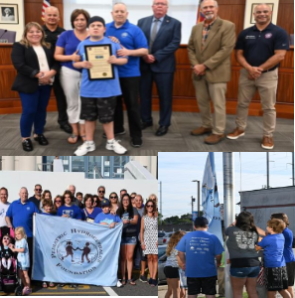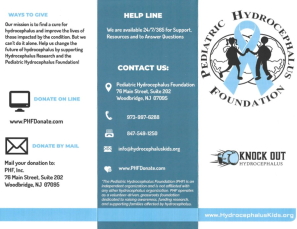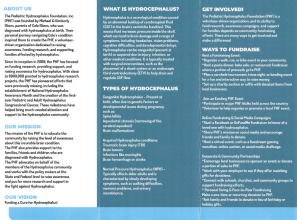2016: National Ambassadors of Hydrocephalus Awareness
December 13, 2015 by PHF
Filed under Uncategorized
Comments Off on 2016: National Ambassadors of Hydrocephalus Awareness

We are looking for one male and one female to serve as our National Ambassadors for Hydrocephalus Awareness for our 2016 National Hydrocephalus Awareness Campaign, with marketing and promotional materials all through the year ending September 2016 with National Hydrocephalus Awareness Month.
We will randomly select ONE male and female from all entries received. Submit a picture of your nominee, between the ages of newborn to 19 years old, with their name and D.O.B. (These pictures MUST BE E-MAILED to mike@hydrocephaluskids.org- Facebook entries are not valid)
The 2 winners will be awarded a 2 NIGHT STAY @ the Crystal City Embassy Suites in Washington DC during our 6th Annual PHF Day of Hydrocephalus Awareness on Capitol Hill Event on 8/18 & 8/19 in 2015, (travel not included).
To enter, email a picture of your nominee, (between the ages of newborn to 19 years old), with their name, D.O.B. & current city & state)
Contest ends 12/31/2015 & Winners announced on 1/2/2016
* Email your picture to mike@hydrocephaluskids.org
* Previous winners are not eligible.
* PHF Board Members & State Chapter Directors ARE eligible to participate.
* By submitting a photo, you agree that the picture may be used in promoting this contest, promotional materials for the PHF, and other PHF outreach campaigns.
Check out the picture galleries of everyone nominated:
The Girls
Edison family hosts dinner to benefit Hydrocephalus research
November 21, 2015 by PHF
Filed under Uncategorized
Comments Off on Edison family hosts dinner to benefit Hydrocephalus research
 Jennifer Westdyke of Edison found out her son Jeffrey likely had hydrocephalus when she was 20 weeks pregnant. Her son, now 9, has battled the disease since birth, undergoing his first brain surgery when he was 3 years old and another two since then.
Jennifer Westdyke of Edison found out her son Jeffrey likely had hydrocephalus when she was 20 weeks pregnant. Her son, now 9, has battled the disease since birth, undergoing his first brain surgery when he was 3 years old and another two since then.
To raise awareness about this incurable brain condition, the Westdyke family is hosting a Funding a Cure for Hydrocephalus Pasta Dinner with the Pediatric Hydrocephalus Foundation on Sunday, Nov. 22, from 2 to 6 p.m. at the Edison Elks 2487 at 375 Old Post Road in Edison.
Hydrocephalus is a condition in which the primary characteristic is excessive accumulation of fluid in the brain, according to the National Institute of Neurological Disorders and Stroke. Some people think of hydrocephalus as “water on the brain;” however it is actually cerebrospinal fluid — a clear fluid that surrounds the brain and spinal cord, according to the institute.
Hydrocephalus can be acquired or congenital. The congenital form is present at birth and may be caused by either genetics or events that occurred during fetal development. Acquired hydrocephalus can develop at the time of birth or at some other point after because of injury or disease.
“There hasn’t been any new technology in a long time,” said Westdyke. “They are still using the same shunt technology from the 1950s.”
She said compared to others with the disease, her son has been fortunate; he is highly functioning, attends regular classes in school and hadn’t had many surgeries. “My son is not the norm. There are many children who have had 30 or 40 surgeries and have had many other problems as a result,” she said.
Hydrocephalus is generally treated by surgically inserting a shunt system that diverts the flow of cerebrospinal fluid to another area of the body where it can be absorbed as part of the normal circulatory process.
The family’s goal with the pasta dinner is to raise awareness about the disease and money to help research.
“Hydrocephalus is an incurable brain condition that affects one in ever 500 newborns, and over a million Americans,” she said. “Adults affected include veterans coming home and football players with head injuries.”
The pasta dinner will feature homemade food, entertainment and more.
“My mom and I rolled 500 meatballs, and my friend makes a great salad that everyone comes back for more,” along with homemade desserts, she said. “We have a DJ, face painting, basket raffles, a 50-50 and vendors, who donate profits. It should be a very fun evening.”
There will be a special appearance by MJX & The 2 Bad Crew Special Needs Dance Class.
It’s all you can eat, and tickets are $10 per adult and $5 per child (4 and younger are no charge).
The Pediatric Hydrocephalus Foundation was founded in New Jersey in 2009 by four families, each having a child with this incurable brain condition, said Michael Illions, the organization’s vice president and director of advocacy. The non-profit charitable organization’s goal is to raise awareness about hydrocephalus and provide support to families, friends and children affected by the condition.
“This is our fifth dinner to raise money,” he said. “We have been very successful in the past, drawing professional wrestlers doing autograph signings, dignitaries, even members of congress. The money is used for research. All of the money goes to that, as we are an all volunteer organization with no salaries.”
The Woodbridge resident’s son, Cole, was born with hydrocephalus, and he and his wife are among the organization’s founders.
“We are hoping to raise $5,000,” Illions added. “It’s just one of the many events we do.”
Other events include the annual New Jersey Walk & Family Fun Day for Hydrocephalus Awareness, which took place in September. This year’s drew 350 people and raised more than $27,000 to fund research projects for better treatment options and to find a cure.
“We donate to hospitals all across the country,” Illions said of how the funds raises are disbursed. “They send us research grant applications, and we evaluate each one.”
His son, at the age of 10, already has had 13 surgeries.
“It really ranges how much children are affected,” he added. “Not every child is the same. There is the possibility of global developmental delays. Some are more affected than others. My son is completely nonverbal.”
Oftentimes, too, problems occur with the shunt, and it has to be fixed or redone. Sometimes surgeries can result in development delays or other complications.
Westdyke said her son didn’t often talk about how having hydrocephalus had affected him. But earlier this year he did, when the the family traveled to Washington, D.C., to talk to staffers, congressman and senators about the disease.
“He said, ‘I’m scared that when I go to sleep at night, I won’t wake up in the morning.’” She added, “He gets it. I couldn’t stop crying when I heard that.”
For more information, visit www.hydrocephaluskids.org/wordpress/.
Tickets for the Nov. 22 dinner are available online at http://www.active.com/donate/phfpasta.
September 30th: “One Day….. One Donation”: PHF Hydrocephalus Awareness Money Bomb!
September 29, 2015 by PHF
Filed under Uncategorized
Comments Off on September 30th: “One Day….. One Donation”: PHF Hydrocephalus Awareness Money Bomb!
PHF September 30th Hydrocephalus Awareness Money Bomb
“One Day….. One Donation”
MAKE YOUR DONATION TODAY!
Click to Enter the Hydrocephalus Awareness MONEY BOMB Donation Website!
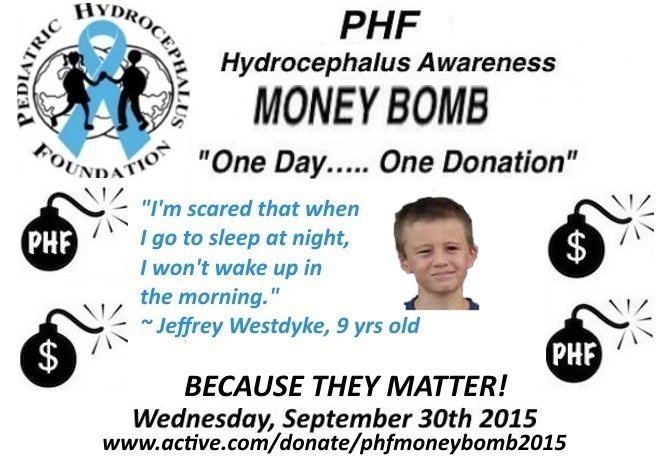
PHF September 30th Hydrocephalus Awareness MONEY BOMB!!!
“ONE DAY….. ONE DONATION”
The Pediatric Hydrocephalus Foundation (PHF), the nation’s #1 advocate for children with Hydrocephalus, needs your help Today for our 3rd Annual Hydrocephalus Awareness MONEY BOMB to raise funds for our amazing initiatives & Hydrocephalus research project funding rolling out in 2015 and beyond!
Last year’s Money Bomb! was a huge success, raising just under $5,000.00 in 24 hours!!
The PHF is dedicated to raising the level of awareness of this incurable brain condition, providing support to those who are diagnosed with Hydrocephalus, and most of all raising money to help fund a cure and better treatment options for our loved ones fighting this battle!
In 2009 the month of September has been named “National Hydrocephalus Awareness Month” and this year has been OUTSTANDING! The outpouring of support the PHF has received from around the country has been INCREDIBLE!
But we need your help TODAY to make it our best month ever for fundraising.
So we’re asking everyone to participate again, in the 3rd Annual Hydrocephalus Awareness MONEY BOMB TODAY so we can end this year’s Hydrocephalus Awareness Month with a bang, and keep the momentum going for the next few months and into 2016!
If every supporter of the PHF who believes in our mission and wants to support the outstanding success we have had as advocates for children and families affected by Hydrocephalus contributes TODAY, we’ll have a record-breaking fundraising success.
We are counting on you to contribute and push the PHF to new heights!!! Click below, and thank you for your generosity!!!
Join us for this special On-Line Fundraising event- PHF’s Hydrocephalus Awareness MONEY BOMB!
“ONE DAY….. ONE DONATION”
As your making your donation, don’t forget to use the “comment” field to give a shout out to your Hydro Hero!
The Pediatric Hydrocephalus Foundation is a non-profit 501 (c) (3) non-profit charitable organization. All donations are tax-deductible.
Click to Enter the Hydrocephalus Awareness MONEY BOMB Donation Website!
Eaton boy battles hydrocephalus, sparks mother to start advocacy group to help
September 29, 2015 by PHF
Filed under Uncategorized
Comments Off on Eaton boy battles hydrocephalus, sparks mother to start advocacy group to help
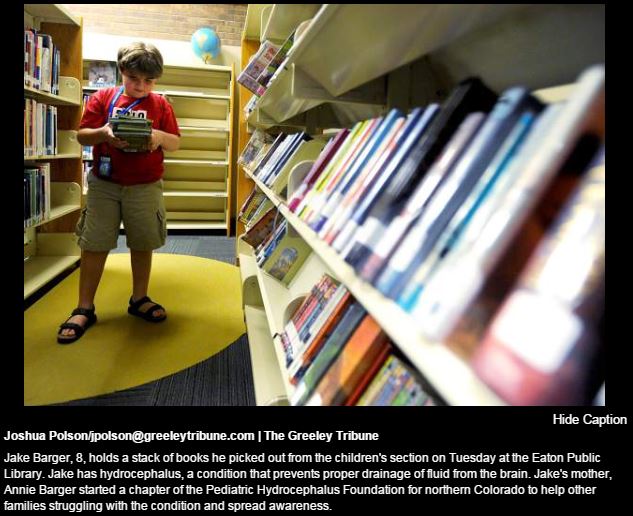
Jake Barger shakes his brown hair in front of his eyes at the Eaton Public Library as he talks about his favorite book series this week. It’s a tie between Magic Tree House and The Boxcar Children. He decides right then to write a crossover novel. The 8-year-old wants to be a judge, a doctor and at this moment, he’s decided to be a writer, too.
Jake’s mom, Annie Barger, watches proudly as her son chatters away about his plans. By now, he’s planning to bring The Avengers into his book. There might even be a movie deal, so he’s added director to his future resume. At this point, Annie’s eyes begin to tear up. Years ago, she didn’t know if Jake would have much of a future.
Annie was seven months pregnant with Jake when an ultrasound showed hydrocephalus in his developing brain. Hydrocephalus, or simply, fluid on the brain, is a birth defect, affecting one or two babies out of every thousand, according to the National Institute of Neurological Disorders and Stroke. There are multiple kinds of hydrocephalus, but in Jake’s case, one of the pathways in his brain where the natural fluid can drain is too narrow, causing it to build up. The Hydrocephalus Association estimates more than a million Americans live with the disorder. It’s the most common reason for brain surgery in children, according to the association. Jake’s first surgery, after all, came when he was 21 days old.
Jake was delivered via caesarean section at the University of Colorado Hospital in Aurora. The doctors told Annie and her husband, Paul, if he survived the delivery, he would be severely disabled all his life. After he was born, doctors told Paul they couldn’t believe they were looking at the same baby they’d been observing in utero. He was too responsive and energetic. Jake’s been surprising people ever since.
As well as Jake does, the defect still is a constant struggle. That’s why Annie started the northern Colorado chapter of the Pediatric Hydrocephalus Foundation. She’s in the process of organizing a fundraiser she hopes will take place by spring. The foundation raises money for hydrocephalus research and provides resources for those suffering from it, as well as education.
Annie’s main goal is to teach people what hydrocephalus is and how to properly handle emergency situations with people like her child.
“Being very vigilant and very proactive in advocating for your children is something that I do, maybe more than I need to, but it’s gotten us really far,” she said. “He’s the reason that we breathe.”
Jake’s had five surgeries. He has a shunt connecting the narrowing in his brain down to his stomach so the fluid can drain. The medical bills are endless, and so are the worries for Paul and Annie. They have to be hyper-vigilant. A headache or nausea could mean a shunt malfunction for Jake. If he complains of pain, or if he’s having trouble finishing his meals, Paul and Annie have a three-day rule — for the three days following the incident, Jake has to take it easy.
For Jake, a bad respiratory infection could cause an infection along the tube, which could be life threatening. Though he hasn’t had a seizure in years, another could always come. Even on a peaceful, happy morning, Annie fears what the afternoon might hold.
Another problem arises every time Jake steps out the door. Despite the commonness of hydrocephalus, not many know what it is or how to handle the disorder. Annie said she fights an uphill battle of education.
For example, once after a trip to the emergency room via an ambulance, a doctor insisted Jake showed symptoms of meningitis and wanted to give the boy a spinal tap. Because Jake’s fluid drainage is regulated by his shunt, a quick shift like that caused by a spinal tap could give him a stroke, Annie said. The doctor wouldn’t listen to her refusals and threatened to call child services if she wouldn’t let him get the procedure.
In school, Jake’s first-grade teacher exacerbated the behavioral issues that come with his disorder by refusing to listen to the medical reasoning or work with him on ways to improve. The hydrocephalus causes Jake to be a very linear thinker. He follows rules and does things as he is told. If he is told to use a blue marker to color a page one day, but then the next, he is told he can’t use that marker, he can get frustrated.
Some teachers were very understanding, though. Jake’s second grade teacher, Jen Delich, worked extensively with Jake to accommodate his needs and help him learn. Annie said she was incredible with him.
As Jake carried a big stack of Magic Tree House books to the front of the Eaton Public Library, Annie lagged behind, smiling as her boy struggled to balance the unwieldy load. He has no depth perception, but has learned to compensate for it, so it’s hardly noticeable. When he’s excited, he spins around in little circles, which he thankfully waited to do until the books were safely on the checkout counter. After the librarian scanned the barcodes and handed the heap back to Jake, he heaved them back into his little arms and hurried over to Annie to put them in the book bag.
“I’m training for American Ninja Warrior,” he said, flexing his little boy muscles.
Add it to the job list.
Editor’s note: This story has been edited from its original version to reflect the grade of one of Jake’s teachers.
This incurable brain condition affects 1 in 500 newborns
September 22, 2015 by PHF
Filed under Uncategorized
Comments Off on This incurable brain condition affects 1 in 500 newborns
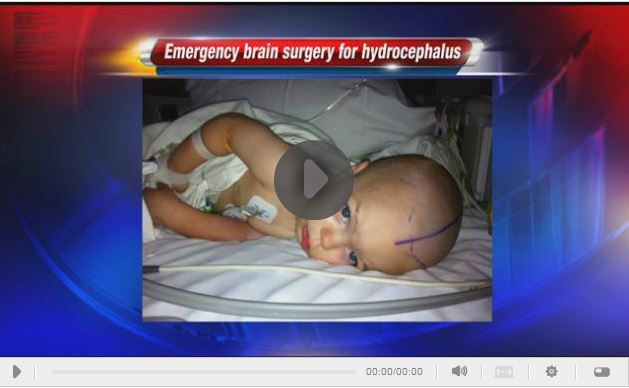
KHQ.COM – Have you head of Hydrocephalus? If you haven’t, it’s not because it’s uncommon. It’s actually more common than down syndrome and 30 times more common than cystic fibrosis. Hydrocephalus just doesn’t get the same attention in the media or as much public funding as other conditions. Hydrocephalus affects 1 in every 500 newborns and it’s the number one reason infants and children have to have brain surgery.
Hydrocephalus is caused when too much cerebrospinal fluid builds up in the brain. Normally, this fluid cushions the brain but if you have too much, it puts harmful pressure on the brain.
For more information on hydrocephalus, click here: http://www.hydrocephaluskids.org/wordpress/?page_id=8
Kandice Curtis knew something was wrong with her son Wes one morning in July 2014. Wes was diagnosed with hydrocephalus and underwent emergency brain surgery. Kandice has since made it her mission to educate herself as much as possible. She has become the director for the Washington chapter of the Pediatric Hydrocephalus Foundation and hopes to be able to help other parents of children with hydrocephalus feel encouraged, empowered and understood as they all watch over their hydro heroes.
“On the morning of July 16, 2014, Wes woke with a 103.2° fever, very lethargic and unsteady on his feet. I immediately took him into his pediatrician. His pediatrician almost sent us home with an antibiotic until he saw Wes lose his balance when walking to the door. This concerned him and he admitted Wes to the hospital to be observed and get blood work done. His white blood cell count was way high and a few other levels were off. Because of the fever and balance issues, they ordered a CT scan. The scans showed a lot of excess fluid in Wes’ brain.
At the time we lived in a small town on the border of Texas and Mexico and the hospital there didn’t have the technology or capabilities to deal with severe cases, so Wes was airlifted to the children’s hospital in San Antonio. We also had a 5 week old baby at the time and had no family living in Texas. It was the scariest thing in the world and near impossible to handle without any family.
Wes had a MRI done in San Antonio which showed the fluid and also a mass the size of a tennis ball in the center of his brain. It was at this time that we called our parents and they were on the next flight out of Spokane and arrived early the morning of the 17th. That was the longest 24 hours of my life. Because I had a 5 wk old I wasn’t allowed in the PICU with Wes and had to get a hotel by myself for the night while Matt stayed at the hospital with Wes.
After a few more tests they knew that the mass was not a tumor and was a fluid filled cyst, which was the best thing it could have been. However, it was so large and in the worse location possible, right in the middle and very difficult to get to and almost impossible to remove. On July 22nd Wes had brain surgery to have a shunt placed in his brain. A shunt is a catheter that drains the fluid in Wes’ brain down to his belly where it gets absorbed by his body. He was diagnosed with hydrocephalus.
The doctors think Wes was born with the cyst and it just got so large that it blocked the flow of his cerebral spinal fluid and caused the hydrocephalus. It’s called obstructive hydrocephalus. Wes will have the shunt for the rest of his life.
We moved back to Spokane in November of 2014. My husband Matt and I are both originally from Spokane and we needed to be closer to family and better healthcare for Wes. Matt got a compassionate transfer through the Border Patrol and now does that here in Spokane. Wes has access to better healthcare here than he’d ever get in Del Rio, TX. He now goes to physical therapy once a week, sees an ophthalmologist every six months (the optic nerves will be the first sign of increased pressure), and has regular check ups with his neurosurgeon. We would have had to drive 3 hours to any of those doctors living in Texas and in an emergency, that drive could have been the difference between life and death.
Now, almost a year later Wes has had 5 MRIs and 3 CT scans. He has not needed another surgery but we are constantly in fear of that possibility. Shunts are imperfect devices and have received very little advancements since they were first invented nearly 60 years ago. Infection and shunt failure is very common.
Signs that the shunt is failing include vomiting, fatigue, irritability, fever, headaches, among a few others. However, headaches are also very common in shunt patients. Wes suffered from chronic headaches for the first 6 months after his surgery. Our new surgeon in Spokane determined they were being caused by the shunt not draining fast enough. Wes has an adjustable valve which can change the rate at which the fluid drains. After changing the setting to a slightly faster flow, Wes’ headaches went away. That was in December of 2014 and he hasn’t complained of a headache since.
We are currently waiting to hear back from a group of surgeons in Seattle. Our surgeon here in Spokane sent off Wes’ scans to get a second opinion. Even though Wes is stable and is progressing with his PT, the size and location of the cyst still concerns the surgeon. Wes will most likely need surgery in the future to address the cyst but for now he is doing great!
I’m a nervous wreck all the time though, watching him closely, making sure he doesn’t fall and hit his head, and watching for signs of shunt failure. Everyone thinks I’m overprotective and I’ll probably get better with time, but it’s almost impossible not to worry all the time.
The hydrocephalus has caused Wes to be a little behind developmentally. He’s not where he should be with his motor and fine motor skills. He didn’t even start walking until he was almost 19 months old. He still has balance issues, he’s unable to jump, and he’s a bit slower than children his age. He turned three last month and is just now learning to run but is still a little cautious.
Every week we see progress with physical therapy. Cognitively he’s right where he needs to be, maybe even a little ahead. He’s very smart, he knows all his letters, can count to 20, backwards from 10 and he can hold a conversation. The cyst is just in an area of his brain that affects his balance which then affects, walking, running, jumping, etc.
Wes will have the shunt for the rest of his life and because it can be easily damaged and clogged, he will not be able to play contact sports such as football, hockey and basketball. One hard fall could not only damage the shunt and catheter but also rupture the cyst which could be fatal. So you can understand why I’m a bit paranoid.
Even though this has been the hardest thing I’ve ever gone through and breaks my heart that my baby has to live with this, Wes’ case is actually one of the better ones. Each case of Hydrocephalus is different and varies in severity. About one in every 500 children born is diagnosed with hydrocephalus. Hydrocephalus is also the leading cause of brain surgery in children. It’s just rarely talked about and underfunded because its overshadowed by other serious conditions.
Shortly after Wes’ surgery I joined the Pediatric Hydrocephalus Foundation (PHF) and their efforts in raising awareness and funds for hydrocephalus research. After Wes was diagnosed, I felt so alone and uninformed and turned to the internet to find answers, wanting to connect with others going through similar situations. I came across the PHF and received immense support through medical advice, shared stories, photos, etc. It was nice meeting parents who had children with the same condition and living with the same fears. I started talking to the President and after a while decided to become a state director and start a chapter here in Washington.
A lot of people haven’t heard of Hydrocephalus or our foundation, so our goal is to educate the community about Hydrocephalus and raise as much money as possible for Hydrocephalus research projects!”
– Kandice Curtis
 Read more at: https://html.com/attributes/img-width/>
Read more at: https://html.com/attributes/img-width/>













